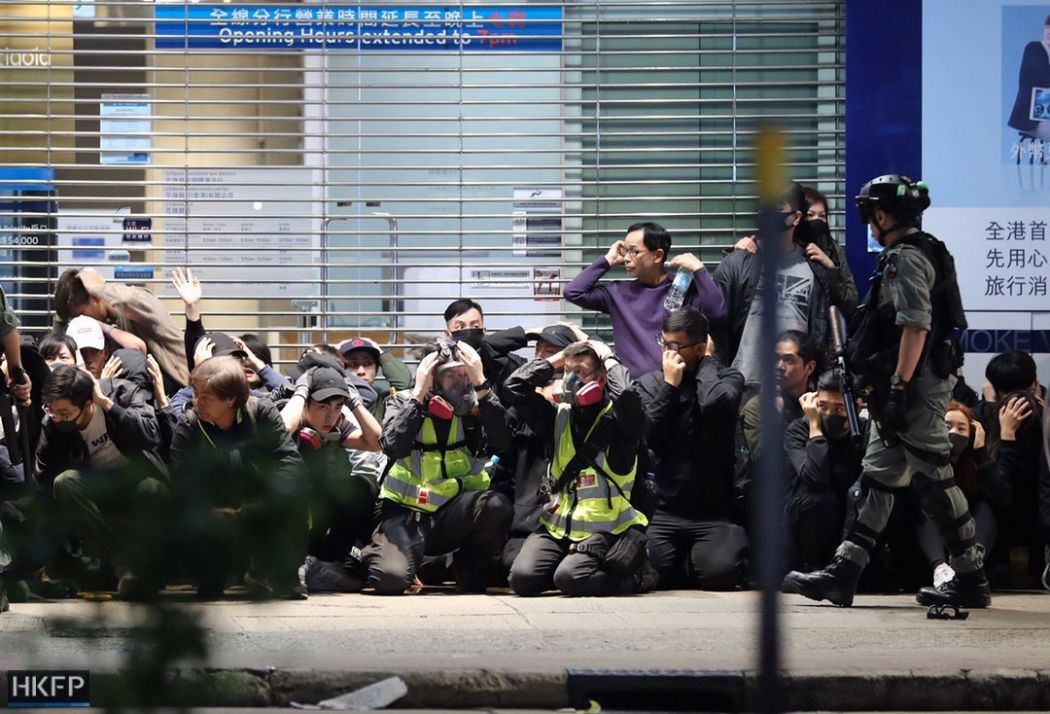The Hong Kong police have said they had no choice but to deploy tear gas against pro-democracy protesters on Wednesday as some people threw objects at officers.
March organisers Civil Human Rights Front (CHRF) estimated that 1.03 million people took to the streets during Hong Kong’s first police-approved protest march of the year. Police said around 60,000 joined at the peak of the march.
The march was cut short after officers clashed with protesters over a vandalised bank.

Senior Superintendent (Operations) Ng Lok-Chun of Hong Kong Island Region told reporters at a press briefing that the force had hoped the march would be held in a peaceful and safe way, and did not want to cut it short.
“We have done a lot to work with the organisers… but a small minority of rioters used violence to obstruct the peaceful march,” he said.

Ng said the police had to take action after a coffee shop and a bank branch were vandalised in Wan Chai. He said police told marchers that they can continue proceeding towards Admiralty, but some people did not want to leave and threw hard objects, paint bombs and bricks towards police.
“Our colleagues gave a warning to [protesters] but they did not listen. We used tear gas to disperse the rioters in front of us only because our colleagues were concerned about their safety,” he said.
See also: HKFP Lens: Molotovs, tear gas and arrests mar end of peaceful mass demo in Hong Kong
“We used tear gas only under the situation where officers were concerned about their safety,” he said.

Ng said the police demanded that the CHRF end the march at 5:30pm after petrol bombs were thrown. Enough time was provided for protesters to leave before another round of tear gas was fired on Tin Lok Lane and Wan Chai Road at around 7pm, he said.
Earlier, the Civil Front said the use of tear gas caused an escalation: “Police subsequently called off the rally and demanded CHRF to evacuate all the crowd in Hong Kong Island within 30 minutes. Riot Police at MTR stations and all exit routes kept searching and provoking citizens, threatening mass arrest. On the first day of year 2020, the Police dismissed the first licensed assembly of the year with [an] absurd excuse.”

The statement said that the government had shown an “unwillingness to listen to the voices of the mass[es], infringing the right of assembly of Hong Kong citizens.”
Since last June, protests over a now-axed extradition bill have evolved into sometimes violent displays of dissent against police action, calls for democracy, and anger over Beijing’s encroachment. Demonstrators are demanding an independent probe into police behaviour, amnesty for those arrested, universal suffrage and a halt to the characterisation of protests as “riots.”
Mass arrest
Around 400 people were arrested on Wednesday, Ng said. However, he denied allegations that police were arresting people arbitrarily and said that the force will investigate each case thoroughly.
“We will not prosecute innocent people,” he said.

The Hong Kong Journalists Association condemned the police for dispersing reporters when officers were clearing protesters in Causeway Bay outside the Sogo department store: “This is directly challenging the bottomline of protection of press freedom stated in the Basic Law,” it said in a statement.
Ng denied police were blocking reporters from covering the news in Causeway Bay, as officers set up a wide cordon when arresting protesters there.

Among those arrested were three observers from the Civil Rights Observer group. The group said it was the first time that observers were arrested since the team was formed in 2018.
“We strongly condemn the arbitrary arrest of observers,” it said.
The group said the arrests were a violation of the Johannesburg Principles which state the government should not block human rights groups from entering areas where there are reasonable grounds to believe that violations of human rights may take place.

The group said it had contacted the police since large-scale protests began in June to explain their roles, and its observers had been able to enter police cordons to observe arrests.
The group said it has contacted lawyers to help the three members and demanded their immediate release.
Masked vandals
Also on Wednesday, two masked men were spotted smashing glass at a China Life Insurance branch in Wan Chai, but – according to local media – the vandals told riot police that they were “on the same side” and were allowed to leave.
Ng denied the allegation that officers were involved: “Police would not damage public property.”
Hong Kong Free Press relies on direct reader support. Help safeguard independent journalism and press freedom as we invest more in freelancers, overtime, safety gear & insurance during this summer’s protests. 10 ways to support us.

